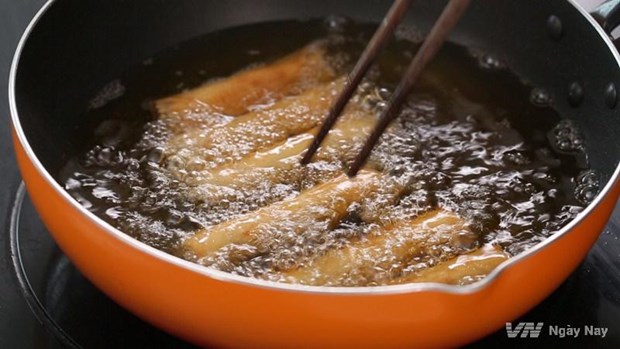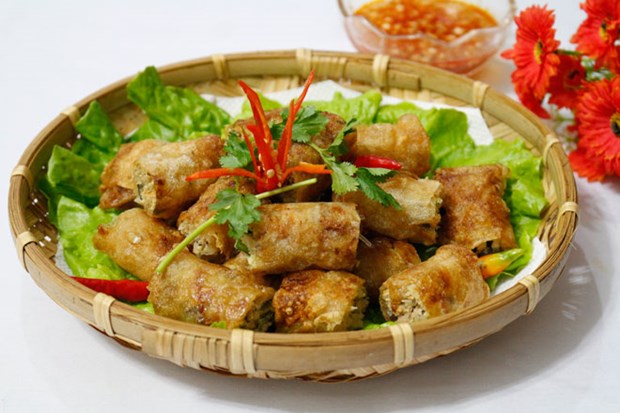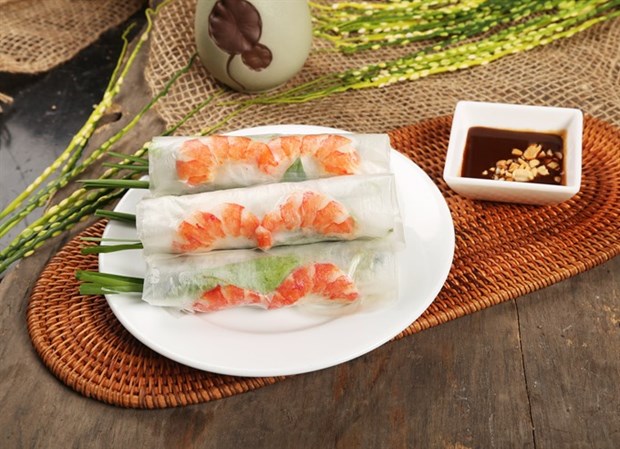Nem rán (or chả giò as it is known in the South) is such a popular traditional
dish that it is hard to attend a Vietnamese wedding, death anniversary or Tết
(Lunar New Year) party without seeing a tray loaded with these delicious spring
rolls.

Fried fun: Nem rán (spring rolls) cooking in oil. Photo: VN Ngay nay
There
are many modern iterations, including vegetarian and seafood variations, but
the traditional dish remains beloved by the people of Việt Nam.
When
one of my son’s friends, Chiam Jia Xin, arrived from Malaysia for a recent
visit, we decided to treat him to traditional dishes such as bún chả (fresh vermicelli and grilled
pork), phở (beef noodle soup) and bánh cuốn (steamed rice roll). Of
course, we also had to include nem rán
and nem cuốn tôm thịt.
I
ordered rice paper – fragrant and not too salted – and wood ear mushrooms from
the wild forests of Cao Bằng province.
On
the day of Chiam’s arrival, I made spring rolls. I minced one kilogram of lean
pork and a large onion, then cut the mushrooms and a carrot into thin threads.
I prepared 0.1 kg of glass noodle and mixed all of the ingredients with four
chicken eggs, a table spoon of quality fish sauce, peppers. After letting the
mixture sit for 10 minutes, it was ready to be wrapped in the rice paper.
Thanks
to the quality of the rice paper, my spring rolls held their shape and did not
break during the 15-minute frying process.
To
achieve the right crispy texture and yellow colour, I filled the pan with
cooking oil and fried them over a light fire.

Tasty tradition: Nem rán are a popular treat.
Whether
the dish is a success also depends on the dipping sauce. Unlike in the South,
northerners often prefer a sweet and sour sauce. Ingredients include vinegar,
fish sauce, sugar, boiled water, chili and garlic.
After
two hours of preparation, the dish was served.
Chiam
was intrigued by the dish and he ate with gusto. “It is very enjoyable,” he
said, noting he had never tried anything with a similar aromatic flavour.
He
enjoyed the spring rolls so much he asked my son to teach him how they are made
so he can recreate the dish for his family in Malaysia.
My
son told him how the dish has been passed down by our ancestors for hundreds of
years. It is considered one of Việt Nam’s national dishes, a representation of
our spirit.
Famous
professor Đỗ Tất Lợi, in his book on traditional medicine, wrote that nem rán has many health benefits,
particularly for weak patients and children.
Chiam
said one of his motivations for visiting Việt Nam was to experience the rich
culinary culture he had heard about for so long. He also wanted to enjoy the
beautiful landscapes and historical sites such as Hoàn Kiếm Lake and the Old
Quarter.

Fresh snack: Nem cuốn (summer rolls) at Quán Ăn Ngon are a must try when visiting Việt Nam.
The
next day, we invited Chiam to join us for gỏi
cuốn tôm thịt at Quán Ăn Ngon restaurant in downtown Hà Nội.
The
restaurant was buzzing with local and foreign diners when we arrived. While we
waited on the food, the restaurant’s culinary expert Lê Kim Chi told us about
the shrimp-pork rolls that have drawn so much praise from customers.
“The
dish is particularly enjoyable in summer because it is very tasty and fresh,”
said Chi.
Chiam
ate two full big plates of the dish, saying he enjoyed the mix of fresh shrimp,
pork and fragrant fennel. They pair perfectly with the dipping sauce of soybean
and roasted peanuts.
He
asked Chi for the recipe so he could share it with his family at home.
For
four people, the recipe calls for 0.5 kg of shrimp, 0.7 kg of pork belly, 50
pieces of rice paper, dill and shallot. The shallot is key – it provides the
aromatic flavour.
Chi
also shared the secret of the tasty dipping sauce. First, fry garlic in oil.
Then add ground soybean sauce, sugar and powdered chili to the pan and cook it
for five minutes, stirring well.
Chi
said the dish is very nutritious, so local families often make it during the
weekend.
The
dish has become a popular staple in Vietnamese restaurants around the world,
Chi noted.
Nem
rán and nem cuốn tôm thịt are key part of culinary culture in Việt Nam; be sure
not to miss them if you come for a visit.
By VNS